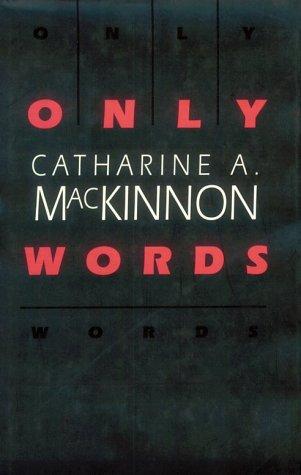152 pages
English language
Published Dec. 26, 1993 by Harvard University Press.

152 pages
English language
Published Dec. 26, 1993 by Harvard University Press.
When is rape not a crime? When it's pornography--or so First Amendment law seems to say: in film, a rape becomes "free speech." Pornography, Catharine MacKinnon contends, is neither speech nor free. Pornography, racial and sexual harassment, and hate speech are acts of intimidation, subordination, terrorism, and discrimination, and should be legally treated as such. Only Words is a powerful indictment of a legal system at odds with itself, its First Amendment promoting the very inequalities its Fourteenth Amendment is supposed to end. In the bold and compelling style that has made her one of our most provocative legal critics, MacKinnon depicts a society caught in a vicious hypocrisy. Words that offer bribes or fix prices or segregate facilities are treated by law as acts, but words and pictures that victimize and target on the basis of race and sex are not. Pornography--an act of sexual domination reproduced in the …
When is rape not a crime? When it's pornography--or so First Amendment law seems to say: in film, a rape becomes "free speech." Pornography, Catharine MacKinnon contends, is neither speech nor free. Pornography, racial and sexual harassment, and hate speech are acts of intimidation, subordination, terrorism, and discrimination, and should be legally treated as such. Only Words is a powerful indictment of a legal system at odds with itself, its First Amendment promoting the very inequalities its Fourteenth Amendment is supposed to end. In the bold and compelling style that has made her one of our most provocative legal critics, MacKinnon depicts a society caught in a vicious hypocrisy. Words that offer bribes or fix prices or segregate facilities are treated by law as acts, but words and pictures that victimize and target on the basis of race and sex are not. Pornography--an act of sexual domination reproduced in the viewing--is protected by law in the name of "the free and open exchange of ideas." But the proper concern of law, MacKinnon says, is not what speech says, but what it does. What the "speech" of pornography and of racial and sexual harassment and hate propaganda does is promote and enact the power of one social group over another. Cutting with surgical deftness through cases of harassment in the workplace and on college campuses, through First Amendment cases involving Nazis, Klansmen, and pornographers, MacKinnon shows that as long as discriminatory practices are protected as free speech, equality will be only a word.